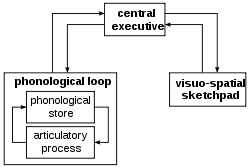Cognitive
Green Red Blue
Purple Blue Purple
Blue Purple Red
Green Purple Green
The Stroop effect is the fact that naming the color of the first set of words is easier and quicker than the second.
Cognitive psychology involves the study of mental processes, including perception, attention, language comprehension and production, memory, and problem solving.[98] Researchers in the field of cognitive psychology are sometimes called cognitivists. They rely on an information processing model of mental functioning. Cognitivist research is informed by functionalism and experimental psychology.
Starting in the 1950s, the experimental techniques developed by Wundt, James, Ebbinghaus, and others re-emerged as experimental psychology became increasingly cognitivist and, eventually, constituted a part of the wider, interdisciplinary cognitive science.[99][100] Some called this development the cognitive revolution because it rejected the anti-mentalist dogma of behaviorism as well as the strictures of psychoanalysis.[100]
Albert Bandura helped along the transition in psychology from behaviorism to cognitive psychology. Bandura and other social learning theorists advanced the idea of vicarious learning. In other words, they advanced the view that a child can learn by observing his or her social environment and not necessarily from having been reinforced for enacting a behavior, although they did not rule out the influence of reinforcement on learning a behavior.[101]
Technological advances also renewed interest in mental states and mental representations. English neuroscientist Charles Sherrington and Canadian psychologist Donald O. Hebb used experimental methods to link psychological phenomena to the structure and function of the brain. The rise of computer science, cybernetics, and artificial intelligence underlined the value of comparing information processing in humans and machines.
A popular and representative topic in this area is cognitive bias, or irrational thought. Psychologists (and economists) have classified and described a sizeable catalogue of biases which recur frequently in human thought. The availability heuristic, for example, is the tendency to overestimate the importance of something which happens to come readily to mind.[102]
Elements of behaviorism and cognitive psychology were synthesized to form cognitive behavioral therapy, a form of psychotherapy modified from techniques developed by American psychologist Albert Ellis and American psychiatrist Aaron T. Beck.
On a broader level, cognitive science is an interdisciplinary enterprise involving cognitive psychologists, cognitive neuroscientists, linguists, and researchers in artificial intelligence, human–computer interaction, and computational neuroscience. The discipline of cognitive science covers cognitive psychology as well as philosophy of mind, computer science, and neuroscience.[103] Computer simulations are sometimes used to model phenomena of interest.
https://en.wikipedia.org/wiki/Psychology#Major_schools_of_thought




